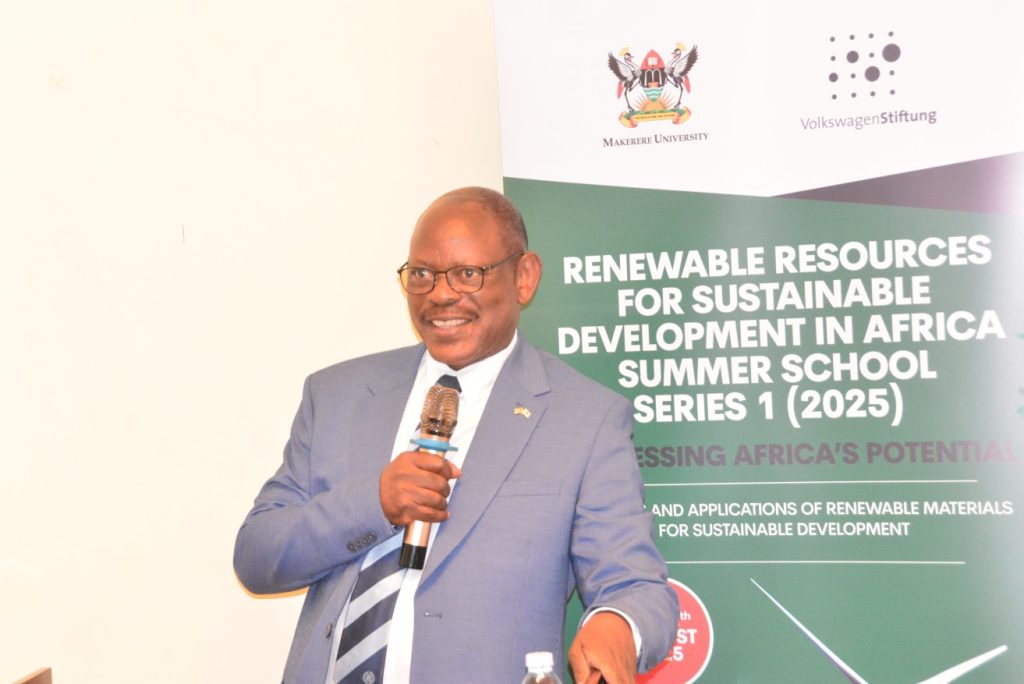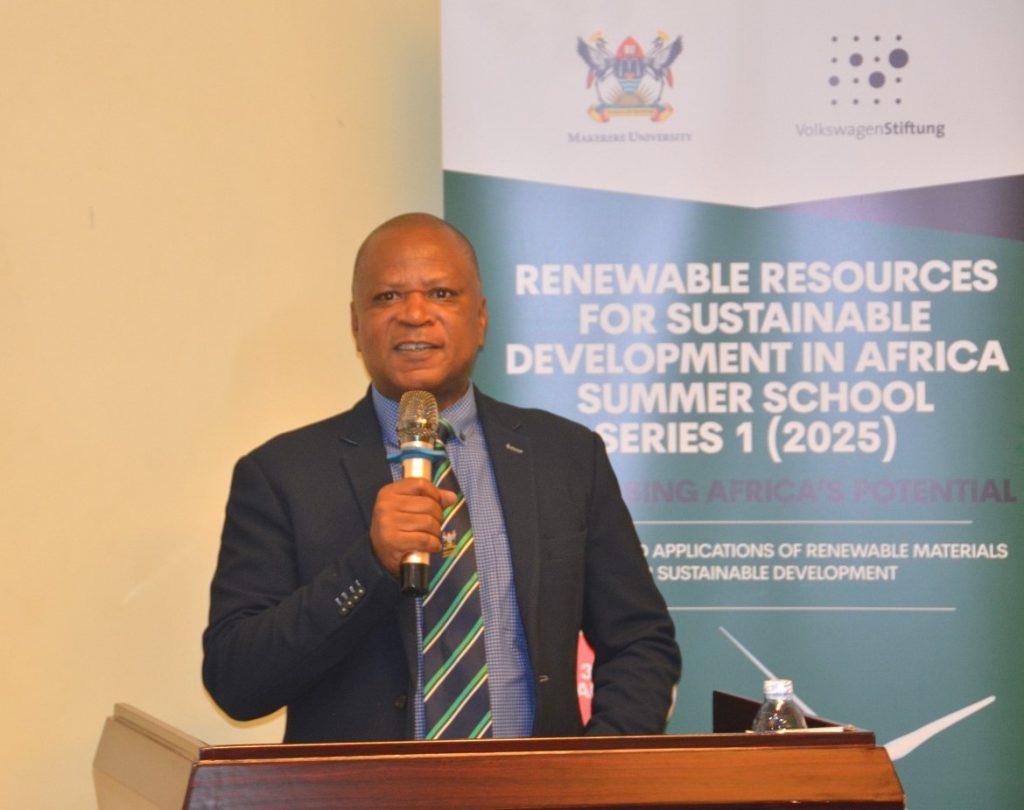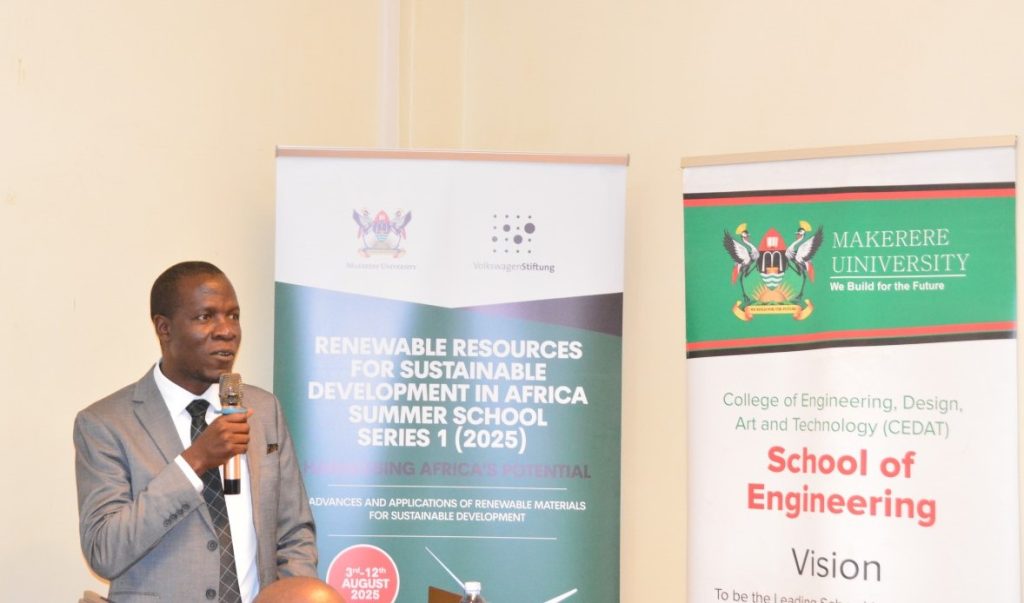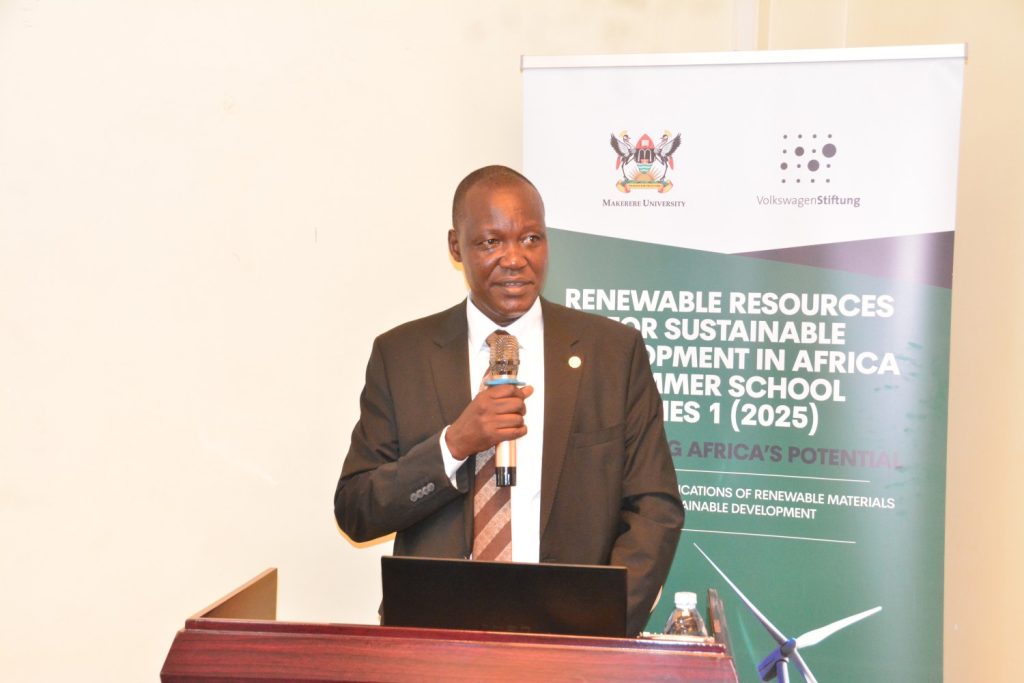Makerere University has officially launched the ReSus Summer School Series 2025–2027, a groundbreaking initiative aimed at equipping Africa’s emerging researchers with the knowledge and tools to harness renewable resources for sustainable development. The program is fully funded by the Volkswagen Foundation under the theme “Renewable Resources for Sustainable Development in Africa (ReSus-AFRICA)”.

Prof. Barnabas Nawangwe, the Vice Chancellor of Makerere University, officiated at the first edition of the series, titled “Harnessing Africa’s Potential – Advances and Applications of Renewable Materials for Sustainable Development,” which ran from 3rd to 12th August 2025, hosted by the College of Engineering, Design, Art and Technology, Department of Mechanical Engineering.
He congratulated Assoc. Prof. Peter Olupot and his team for securing the grant that enabled Makerere University to host the Summer School. He expressed deep gratitude to the Volkswagen Foundation for dedicating resources to support Africa’s efforts to overcome poverty. Highlighting a critical concern, he noted that Africa contributes only 2–3% of globalinnovations and publications, a figure that mirrors the continent’s overall levels of productivity and output. He emphasized that the wealth a society generates is directly linked to its investment inresearch and innovation across all sectors. The limited research activity, he argued, has constrained Africa’s development. He called on the university to play a transformative role in lifting communities out of poverty, asserting that this can only be achieved through robust, impactful research. Finally, he encouraged scholars to build meaningful networks that foster collaboration and generate practical solutions to the challenges facing the continent.

Prof. Moses Musinguzi, Principal of CEDAT, provided an overview of the college’s structure and its role in advancing engineering and technological education in Uganda. In his remarks, he reflected on Africa’s paradox being the most resource-rich continent yet among the least developed. He emphasized that despite the abundance of natural resources, Africa continues to face significant development challenges, largely due to limited investment in research and innovation.
Addressing the participants, who are primarily young researchers, Prof. Musinguzi issued a call to action:
“We see the future in you as the emerging leaders of Africa. It is your responsibility to drive the continent forward and position it to compete globally.”
He urged the scholars to broaden the discourse on natural resources, encouraging them to explore their potential not only as commodities but as catalysts for sustainable development, industrial transformation, and inclusive growth.

Dr. Abubaker Waswa Matovu, representing the Dean of the School of Engineering, addressed the multi-national cohort of participants with a strong message on the importance of collaboration in research. He emphasized that meaningful networks are the foundation of impactful scientific inquiry and innovation.
“Research is all about collaboration,” he stated, encouraging participants to forge lasting connections that transcend borders and disciplines.
Dr. Matovu highlighted that many of the challenges faced globally, such as climate change, energy access, and infrastructure development, are shared across regions. He urged the participants to use both the summer school and their future endeavors to contribute to solutions that advance sustainable development, not only for Africa but for the world at large.
He also outlined the structure of the School of Engineering, detailing its various departments and academic programs. These, he noted, stand to benefit significantly from the insights and knowledge exchanged during the summer school, reinforcing the school’s commitment to fostering innovation and excellence in engineering education.

Assoc. Prof. Peter W. Olupot, Head of the Department of Mechanical Engineering at CEDAT, highlighted that the 2025 Summer School will address several critical thematic areas, including:
- Industrial applications of renewable materials
- Bioplastics, bio-composites, and biodegradable materials
- Sustainable building technologies and food systems
- Hydrogen technologies and life cycle assessments
He noted that participants will engage in a comprehensive program comprising expert-ledlectures, interactive workshops, field visits to renewable energy sites across Uganda, and networking sessions aimed at fostering enduring research collaborations across borders. “Our goal is to bring together researchers to form a robust network capable of tackling sustainability challenges,” Assoc. Prof. Olupot stated.
With Africa’s population expected to reach 2.5 billion by 2050, and a median age of just 23.9, the continent faces mounting challenges in food security, energy access, water scarcity, and housing. The Summer School Series seeks to address these issues by promoting localized, renewable solutions and fostering cross-disciplinary collaboration among young African scientists.
The program participants are The Summer School is coordinated by a team of distinguished academics that include
- Assoc. Prof. Peter Wilberforce Olupot and Assoc. Prof. Michael Lubwama (Makerere University, Uganda)
- Assoc. Prof. Yetenayet Bekele Tola (Jimma University, Ethiopia)
- Assoc. Prof. Duncan Onyango Mbuge (University of Nairobi, Kenya)
- Prof. Kouassi Dongo (Swiss Center for Scientific Research, Côte d’Ivoire)

Save our deteriorating environment, I applaud your efforts